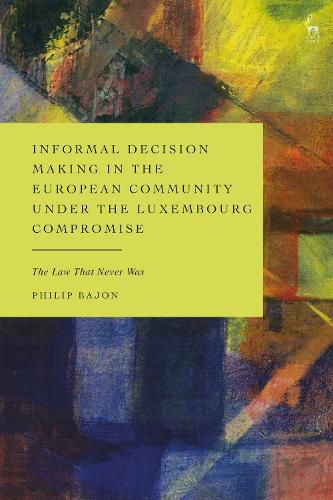Readings Newsletter
Become a Readings Member to make your shopping experience even easier.
Sign in or sign up for free!
You’re not far away from qualifying for FREE standard shipping within Australia
You’ve qualified for FREE standard shipping within Australia
The cart is loading…






This book analyses the informal decision making process in the EU against the background of a gradually emerging European legal order.
Based on extensive multi-archival research in the UK, France, Germany, the Benelux countries and in Community institutions, the book explores the resistance against majority rule under the so-called Luxembourg Compromise of 1966, a European 'soft law' that allowed Member States to invoke 'vital national interests' and to veto legislation. This 'gentlemen's agreement' was never sanctioned or codified. However, as a 'rule of the game' it had a significant impact on the operations of the EU for several decades and became an integral part of the EU's 'consensus' approach. Its underlying rationale is still alive in the present-day EU.
Presenting a deeply revisionist account of European law and politics, the book demonstrates how the Luxembourg arrangement served as a compromise between the Treaty text and political reality, as a counterweight to technocratic ideas, and as a bridge between irreconcilable divides over European unification.
It includes case studies from 1965 - 2000, such as the 'Eurosclerosis' of the 1970s, British exceptionalism as an EU member, the European revival of the mid-1980s, and intergovernmentalism on the verge of negotiating the Maastricht Treaty.
Highly original in its interdisciplinary, comprehensive and archivally-rooted method, the book interrogates the most important and controversial debates about the past, present and future of the European Union.
$9.00 standard shipping within Australia
FREE standard shipping within Australia for orders over $100.00
Express & International shipping calculated at checkout
This book analyses the informal decision making process in the EU against the background of a gradually emerging European legal order.
Based on extensive multi-archival research in the UK, France, Germany, the Benelux countries and in Community institutions, the book explores the resistance against majority rule under the so-called Luxembourg Compromise of 1966, a European 'soft law' that allowed Member States to invoke 'vital national interests' and to veto legislation. This 'gentlemen's agreement' was never sanctioned or codified. However, as a 'rule of the game' it had a significant impact on the operations of the EU for several decades and became an integral part of the EU's 'consensus' approach. Its underlying rationale is still alive in the present-day EU.
Presenting a deeply revisionist account of European law and politics, the book demonstrates how the Luxembourg arrangement served as a compromise between the Treaty text and political reality, as a counterweight to technocratic ideas, and as a bridge between irreconcilable divides over European unification.
It includes case studies from 1965 - 2000, such as the 'Eurosclerosis' of the 1970s, British exceptionalism as an EU member, the European revival of the mid-1980s, and intergovernmentalism on the verge of negotiating the Maastricht Treaty.
Highly original in its interdisciplinary, comprehensive and archivally-rooted method, the book interrogates the most important and controversial debates about the past, present and future of the European Union.